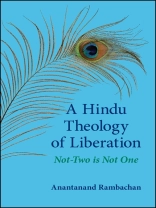Discusses Hindu Advaita Vedānta as a philosophy of social justice for the modern world.
Finalist for the 2016 Book Award for Excellence in the Study of Religion, in the Constructive-Reflective category presented by the American Academy of Religion
This engaging and accessible work provides an introduction to the Hindu tradition of Advaita Vedānta and brings it into discussion with contemporary concerns. Advaita, the non-dual school of Indian philosophy and spirituality associated with Śaṅkara, is often seen as ‘other-worldly, ‘ regarding the world as an illusion. Anantanand Rambachan has played a central role in presenting a more authentic Advaita, one that reveals how Advaita is positive about the here and now. The first part of the book presents the hermeneutics and spirituality of Advaita, using textual sources, classical commentary, and modern scholarship. The book’s second section considers the implications of Advaita for ethical and social challenges: patriarchy, homophobia, ecological crisis, child abuse, and inequality. Rambachan establishes how Advaita’s non-dual understanding of reality provides the ground for social activism and the values that advocate for justice, dignity, and the equality of human beings.
Зміст
Abbreviations
Introduction
What Is Advaita?
Is Advaita a Theological Tradition?
The Need for an Advaita Theology of Liberation
Not-Two Is Not One
Structure of Text
Part One
1.The Quest for Fullness
Human Problem as Suffering
The Universal Desire for Happiness
Suffering as Mortality Anxiety
Suffering and the Transient Nature of Experiences
Suffering as the Experience of Inadequacy
Inadequacy and the Multiplication of Desires
The Persistence of Inadequacy
Overcoming the Problem of Inadequacy: The Limits of Action
Despair as Opportunity
The Uncreated Infinite
The Human Problem as Ignorance (Avidyā)
2. The Validity of Non-Duality
Vedas: The Source of Liberating Knowledge
The Threefold Criteria for Valid Knowledge
The Subject Matter of the Vedas
The Action and Knowledge Sections of the Vedas
Relationship between the Means of Knowledge and Object
The Liberating Power of Words
The Value of a Teacher
The Necessity of Faith (Śraddhā)
A Teaching Tradition
3. The Full Self
The Method of Distinguishing Knower and Known
The Singularity of the Self
The Immortality of the Self
The Self as Free from the Limits of Time
The Unity of the Self
The Self as Free from Space Limits
The Relationship Between Cause and Effect
Overcoming the Brahman-World Dualism
The Purpose of Creation in Advaita
4. The Liberated Life
Suffering and Ignorance
Knowledge and Liberation
The Meaning of Saṁsāra
Ignorance and Its Consequences
Untying the Knots of the Heart (Ignorance-Greed-Greedful Actions)
The Social Implications of Liberation
Identity with All Beings as Love
Compassion
Generosity
Interdependent Existence
Control-Give-Have Compassion
Part Two
5. Liberation from Patriarchy
Paradoxical Attitudes toward Women
The Significance of Women in Relation to Men
Dowry and the Devaluation of Women
Religious Rituals and the Preference for Sons
Karma and Violence to Women
The Intrinsic Value of Women
The Necessity to Connect Religious Teaching and Social Reality
Ahiṁsā: Its Significance for Women
Ahiṁsā and Justice for Women
Justice as the Fulfillment of Mutual Obligations
Feminine Images of God and the Empowerment of Women
Scriptural Resources for Overcoming Patriarchy
Ignorance and Patriarchy
6. Liberation from Homophobia
The Reality of Homophobia
Recognizing Third Sex Persons
The Case of Arjuna in Mahābhārata
Third Sex Persons in the Law Codes
Divine Immanence and the Value of the Person
Sex and Liberation (Mokṣa)
Procreation, Marriage, and Third Sex
Recovering Indigenous Theological Resources
7. Liberation from Anthropocentrism
Brahman as Ontological Ground of Nature
Dualistic and Non-dualistic Views of Nature
The Devaluation of Nature in Advaita
Affirming the Value of Nature in Advaita
Liberation and the Significance of Nature
Nature and the Yajña Mode of Being
Nature and the Moral Order of the Universe
Liberation from Greed and Stewardship
8. Liberation from Childism
The Suffering of the Child
The Religious Value of the Child
Birth Replicates Cosmic Creation
Brahman Is Present Equally in All Beings
Value for Brahman Expressed in Compassion
Ahiṁsā (Non-Injury) and the Value of the Child
Honoring the Divinity in the Child
The Girl Child in the Hindu Perspective: Ideal and Reality
Religious Value and the Provision of Needs
The Obligation to Life
The Obligation to a Healthy Life
The Obligation to Education
The Obligation to Leisure and Happiness
The Obligation to Non-Injury and Freedom from Exploitation
9. Liberation from Caste
A Personal Encounter
The Reality of Caste Oppression
Caste Privileges and the Negativized Others
Change, Conversion, and Leadership
Dalits and Hindu Identity
Self-Value and the Devaluation of Others
Affirming Equal Worth and Justice for All
The Story of Śaṅkara and the Untouchable
The Exegesis of Bhagavadgītā
Caste and the Authority of Scripture
Dharma, Caste, and Liberation
Conclusion
Notes
Bibliography
Index
Про автора
Anantanand Rambachan is Professor of Religion at St. Olaf College and the author of The Advaita Worldview: God, World, and Humanity, also published by SUNY Press.







![Обкладинка Brian Schrag & Julisa Rowe: Community Arts for God's Purposes [Chinese] 貼近神心意的社群藝術 Обкладинка Brian Schrag & Julisa Rowe: Community Arts for God's Purposes [Chinese] 貼近神心意的社群藝術](https://static.worldofdigitals.com/thumb_webp/740/9781645083740.webp)




